Supreme Court orders ‘Remain in Mexico’ policy reinstated
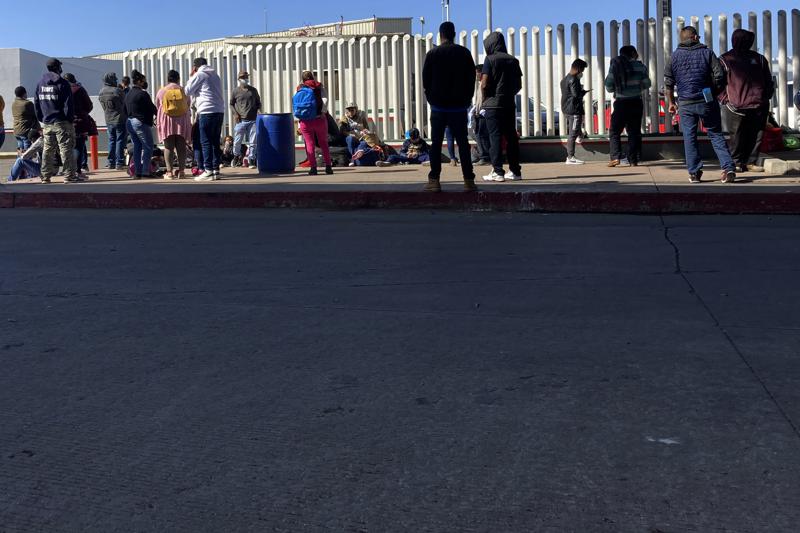
The Supreme Court on Tuesday said the Biden administration likely violated federal law in trying to end a Trump-era program that forces people to wait in Mexico while seeking asylum in the U.S. With three liberal justices in dissent, the high court refused to block a lower court ruling ordering the administration to reinstate the program informally known as Remain in Mexico. It’s not clear how many people will be affected and how quickly. Under the lower court ruling, the administration must make a “good faith effort” to restart the program. There also is nothing preventing the administration from trying again to end the program, formally called Migrant Protection Protocols. A federal judge in Texas had previously ordered that the program be reinstated last week. Both he and the 5th U.S. Circuit Court of Appeals refused the administration’s request to put the ruling on hold. Justice Samuel Alito ordered a brief delay to allow the full court time to consider the administration’s appeal to keep the ruling on hold while the case continues to make its way through the courts. The 5th Circuit ordered expedited consideration of the administration’s appeal. The court offered little explanation for its action, although it cited its opinion from last year rejecting the Trump administration’s effort to end another immigration program, Deferred Action for Childhood Arrivals. In that case, the court held that the decision to end DACA was “arbitrary and capricious,” in violation of federal law. The administration has “failed to show a likelihood of success on the claim that the memorandum rescinding the Migrant Protection Protocols was not arbitrary and capricious,” the court wrote Tuesday in an unsigned order. The three dissenting justices, Stephen Breyer, Elena Kagan, and Sonia Sotomayor, did not write an opinion expressing their views of the case. In a statement, the Department of Homeland Security said it regrets that the high court declined to issue a stay. The department said it would continue to challenge the district court’s order. The American Civil Liberties Union called on the administration to present a fuller rationale for ending Remain in Mexico that could withstand court scrutiny. “The government must take all steps available to fully end this illegal program, including by re-terminating it with a fuller explanation. What it must not do is use this decision as cover for abandoning its commitment to restore a fair asylum system,” said Omar Jadwat, director of the ACLU’s immigrant rights project. During Donald Trump’s presidency, the policy required tens of thousands of migrants seeking asylum in the U.S. to turn back to Mexico. It was meant to discourage asylum seekers, but critics said it denied people the legal right to seek protection in the U.S. and forced them to wait in dangerous Mexican border cities. The judge, U.S. District Judge Matthew J. Kacsmaryk in Amarillo, Texas, ordered that the program be reinstated in response to a lawsuit filed by the states of Texas and Missouri, whose governors have been seeking to reinstate some of the hard-line anti-immigration policies of the Trump administration. The Biden administration argued in briefs that the president has “clear authority to determine immigration policy” and that Homeland Security Secretary Alejandro Mayorkas had discretion in deciding whether to return asylum seekers to Mexico. The policy has been dormant for more than a year, and the administration argued that abruptly reinstating it “would prejudice the United States’ relations with vital regional partners, severely disrupt its operations at the southern border, and threaten to create a diplomatic and humanitarian crisis.” The Trump administration largely stopped using the “Remain in Mexico” policy at the start of the pandemic, at which point it began turning back virtually everyone crossing the Southwest border under a different protocol — a public health order that remains in effect. President Joe Biden suspended the program on his first day of office, and the Homeland Security Department ended it in June. Kacsmaryk was nominated to the federal bench by Trump. The 5th Circuit panel that ruled Thursday night included two Trump appointees, Andrew Oldham and Cory Wilson, along with Jennifer Walker Elrod, nominated to the appeals court by President George W. Bush. At the high court, at least five of the six conservative justices, including three Trump appointees, voted for the restart of the program. Under the court’s opaque treatment of emergency appeals, the justices don’t always say publicly how they voted. Republished with the permission of the Associated Press.
Jeff Sessions: Judges costing taxpayers with immigration rulings

U.S. Attorney General Jeff Sessions told an audience of hundreds of judges and attorneys on Friday that “erroneous rulings” by federal judges have been costly to taxpayers, and he criticized judges who’ve thwarted some of President Donald Trump‘s immigration policies. Sessions, speaking during a judicial conference in Des Moines, also lambasted what he said was an increasing number of federal appeals courts that have issued nationwide injunctions on federal policy. He cited a case involving Chicago, which filed a lawsuit challenging the Trump administration’s sanctuary cities policy, and decisions by judges that repeatedly halted Trump’s travel ban that targeted mostly Muslim countries. “I got to tell you, it’s not the duty of the courts to manage the executive branch or to pass judgment on every policy the executive branch was elected to carry out,” Sessions told the roughly 700 people attending the Eighth Judicial District Conference. “Judges aren’t sent from Olympus. They’re not always correct,” he added. Trump has also panned judges who’ve blocked his immigration policies, including those who ruled against his administration’s effort to end the Deferred Action for Child Arrivals program, or DACA. The program, enacted during President Barack Obama‘s administration, has authorized around 700,000 people brought to the U.S. illegally as children to obtain work permits and driver’s licenses. A federal judge halted a deportation process earlier this month and threatened to hold Sessions in contempt if the mother and daughter weren’t returned to the U.S. During his Friday speech, Sessions was complimentary of Trump’s choices for federal judges — but he didn’t address criticisms levied against him by Trump this week. Trump has openly criticized Sessions for recusing himself from special counsel Robert Mueller‘s investigation into Russian involvement in the 2016 campaign. This week, Trump tweeted “if we had a real Attorney General” the investigation would never have been started. U.S. Supreme Court Justice Neil Gorsuch — appointed to the nation’s highest court by Trump last year — also addressed the conference, which was open to those in the legal profession from seven Midwest states. He discussed among other things the importance of the rule of law and separation of powers. “I think that the right to have an independent judge tell you what the law is, no matter who you are, is one of the great liberties and genius of the constitutional design,” Gorsuch said. “It’s something that’s very real today for the immigrant, the criminal defendant, the unpopular, the minority.” Guy Cook, a trial lawyer from Des Moines, said he thought Sessions was engaging and covered a wide range of topics. But he said he found it remarkable that the attorney general chose a conference of federal judges and lawyers to make remarks critical of federal judge rulings challenging the Trump administration. “He did seem to go out of his way to emphasize the three equal branches of government, and from that made the argument that the judicial branch should not overstep its bounds,” he said. Outside the convention center hosting the event, about 100 people staged a “No Hate In Our State” protest targeting Sessions for his hardline positions on immigration, including support of the Trump administration’s separation of children from their parents at the U.S.-Mexico border. Community organizer Matthew Covington said Sessions has not been kind to any marginalized group and has actively undermined voting rights. “We’re just a variety of groups and individuals who agree that his message of hate shouldn’t be allowed in this state,” Covington said. Republished with permission from the Associated Press.
For now, Army suspends discharges of immigrant recruits

The U.S. Army has stopped discharging immigrant recruits who enlisted seeking a path to citizenship — at least temporarily. A memo shared with The Associated Press spells out orders to high-ranking Army officials to stop processing discharges of men and women who enlisted in the special immigrant program. “Effective immediately, you will suspend processing of all involuntary separation actions,” read the memo signed July 20 by Acting Assistant Secretary of the Army for Manpower and Reserve Affairs Marshall Williams. The disclosure comes one month after the AP reported that dozens of immigrant enlistees were being discharged or had their contracts cancelled. Some said they were given no reason for their discharge. Others said the Army informed them they’d been labeled as security risks because they have relatives abroad or because the Defense Department had not completed background checks on them. In a statement Thursday, Army Lt. Col. Nina L. Hill said they were stopping the discharges in order to review the administrative separation process. The decision could impact hundreds of enlistees. “We continue to abide by all requirements to include completing a thorough background investigation” on all recruits, she said. The Army has reversed one discharge, for Brazilian reservist Lucas Calixto, 28, who had sued. Nonetheless, discharges of other immigrant enlistees continued. Attorneys sought to bring a class action lawsuit last week to offer protections to a broader group of reservists and recruits in the program, demanding that prior discharges be revoked and that further separations be halted. A judge’s order references the July 20 memo, and asks the Army to clarify how it impacts the discharge status of Calixto and other plaintiffs. As part of the memo, Williams also instructed Army officials to recommend whether the military should issue further guidance related to the program. Margaret Stock, an Alaska-based immigration attorney and a retired Army Reserve lieutenant colonel who helped create the immigrant recruitment program, said Wednesday the memo proves there was a policy. “It’s an admission by the Army that they’ve improperly discharged hundreds of soldiers,” she said. “The next step should be go back and rescind the people who were improperly discharged.” Discharged recruits and reservists reached Thursday said their discharges were still in place as far as they knew. One Pakistani man caught by surprise by his discharge said he was filing for asylum. He asked that his name be withheld because he fears he might be forced to return to Pakistan, where he could face danger as a former U.S. Army enlistee. The reversal comes as the Defense Department has attempted to strengthen security requirements for the program, through which historically immigrants vowed to risk their lives for the promise of U.S. citizenship. President George W. Bush ordered “expedited naturalization” for immigrant soldiers after 9/11 in an effort to swell military ranks. Seven years later the Military Accessions Vital to the National Interest program, known as MAVNI, became an official recruiting program. It came under fire from conservatives when President Barack Obama added DACA recipients — young immigrants who were brought to the U.S. illegally as children — to the list of eligible enlistees. In response, the military layered on additional security clearances for recruits to pass before heading to boot camp. The Trump Administration added even more hurdles, creating a backlog within the Defense Department. Last fall, hundreds of recruits still in the enlistment process had their contracts canceled. Government attorneys called the recruitment program an “elevated security risk” in another case involving 17 foreign-born military recruits who enlisted through the program but have not been able to clear additional security requirements. Some recruits had falsified their background records and were connected to state-sponsored intelligence agencies, the court filing said. Eligible recruits are required to have legal status in the U.S., such as a student visa, before enlisting. More than 5,000 immigrants were recruited into the program in 2016, and an estimated 10,000 are currently serving. Nearly 110,000 members of the Armed Forces have gained citizenship by serving in the U.S. military since Sept. 11, 2001, according to the Defense Department.’ Republished with the permission of the Associated Press.
House rejects hard-right immigration bill, baring GOP divide
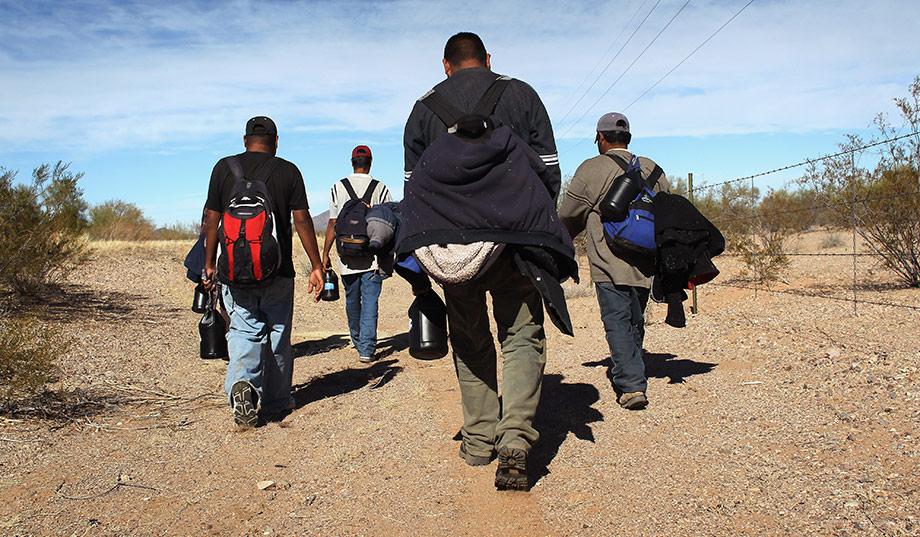
The House killed a hard-right immigration bill Thursday, and Republican leaders delayed a planned vote on a compromise GOP package with the party’s lawmakers fiercely divided over an issue that has long confounded them. The conservative measure was defeated 231-193, with 41 Republicans — mostly moderates — joining Democrats in voting against it. Those defections — nearly 1 in 5 GOP lawmakers — underscored the party’s chasm over immigration and the election-year pressures Republicans face to stay true to districts that range from staunchly conservative to pro-immigrant. Thursday’s vote set the stage for debate on the second bill, this one crafted by Republican leaders in hopes of finding an accord between the party’s sparring moderate and conservative wings. That compromise was considered too lenient by some conservatives and seemed likely to fall, too, and aides said the final roll call would wait till Friday. Rejection of both would represent an embarrassment for President Donald Trump, who had embraced them. As if the internal GOP turmoil was not enough, the party’s political exposure on the issue has been intensified by heartbreaking images of migrant children separated from families and complicated by opaque statements by Trump. At the White House, Trump defended his administration’s “zero tolerance” policy of prosecuting all migrants caught illegally entering the country, a change that has caused thousands of families to be divided while the parents are detained. He said without it, “you would have a run on this country the likes of which nobody has ever seen.” He said he was inviting Congress’ top two Democrats, House Minority Leader Nancy Pelosi and Senate Minority Leader Chuck Schumer, to the White House for immigration bargaining. He called them “extremist open-border Democrats.” And in a tweet that seemed to undermine House leaders’ efforts to round up votes, he questioned the purpose of their legislation by suggesting it was doomed in the Senate anyway. Trump issued an executive order Wednesday aimed at reversing his own policy of taking immigrant children from their detained parents, but emotions remained high. “I was welcomed here,” a tearful Rep. Norma Torres, D-Calif., said during House debate, describing her journey to the U.S. as a child from Guatemala. “I was not put in a freezing cell.” In an embarrassing detour, the House used an early procedural vote to correct what Republicans called a drafting error — language providing $100 billion more than they’d planned to help build Trump’s proposed border wall with Mexico. Instead of giving initial approval for $24.8 billion spread over the next five years, the legislation said it would open the door to $24.8 billion “for each” of the next five years. The rejected conservative bill would have granted no pathway to citizenship for young “Dreamers” who arrived in the country illegally as children, curbed legal immigration and bolstered border security. The second was a compromise between GOP moderates and the party’s conservatives that included an opportunity for citizenship for the young immigrants. It provides $25 billion for Trump’s wall, restrictions on legal immigration and language requiring the Homeland Security Department to keep migrant families together while they’re being processed for illegal entry to the U.S. Democrats oppose both measures as harsh. “It is not a compromise,” House Minority Leader Nancy Pelosi, D-Calif., told reporters. “It may be a compromise with the devil, but it is not a compromise with the Democrats.” Even before votes began, Trump complicated GOP efforts to round up votes. “What is the purpose of the House doing good immigration bills when you need 9 votes by Democrats in the Senate, and the Dems are only looking to Obstruct (which they feel is good for them in the Mid-Terms),” Trump wrote. “Republicans must get rid of the stupid Filibuster Rule-it is killing you!” In the unlikely event that the House approved the GOP compromise, it seemed certain to go nowhere in the GOP-run Senate. Democrats there have enough votes to use procedural delays to kill it. Sixty votes are needed to end filibusters. On Wednesday, Trump reversed himself and took executive action aimed at curbing the separation of families. His order seemed to stem some of the urgency for Congress to act. But GOP leaders were eager to hold the votes anyway. The roll calls would let Republicans assert to voters that they tried addressing the immigration problem. “Our members wanted to express themselves on an issue they care a great deal about,” Speaker Paul Ryan said. Passage of the GOP compromise was always a long shot, but failure may now come at a steeper price. Republicans and Trump have raised expectations that, in control of Congress and the White House, they can fix the nation’s long-standing immigration problems. When the crisis of family separations erupted at the border, GOP leaders revised the compromise bill to bolster a provision requiring parents and children to be held together in custody. It did so by eliminating the 20-day cap on holding minors and allowing indefinite detentions. Even though Trump has acted unilaterally to stem the family separations, lawmakers still prefer a legislative fix. The administration is not ending its “zero tolerance” approach to border prosecutions. If the new policy is rejected by the courts, which the administration acknowledges is a possibility, the debate could move back to square one. Senate Republicans, fearing Trump’s action will not withstand a legal challenge and eager to go on record opposing the administration’s policy, have unveiled their own legislation to keep detained immigrant families together. In the House, moderate Republicans forced the immigration debate to the fore by threatening to use a rare procedure to demand a vote. Led by Curt Curbelo and Rep. Jeff Denham, R-Calif., many are from states with large populations of young “Dreamer” immigrants who now face deportation threats under Trump’s decision to end the Obama-era Deferred Action for Childhood Arrivals program. A federal court challenge has kept the DACA program running for now. Republished with permission from the Associated Press.
House Republicans to offer 2 separate bills on immigration
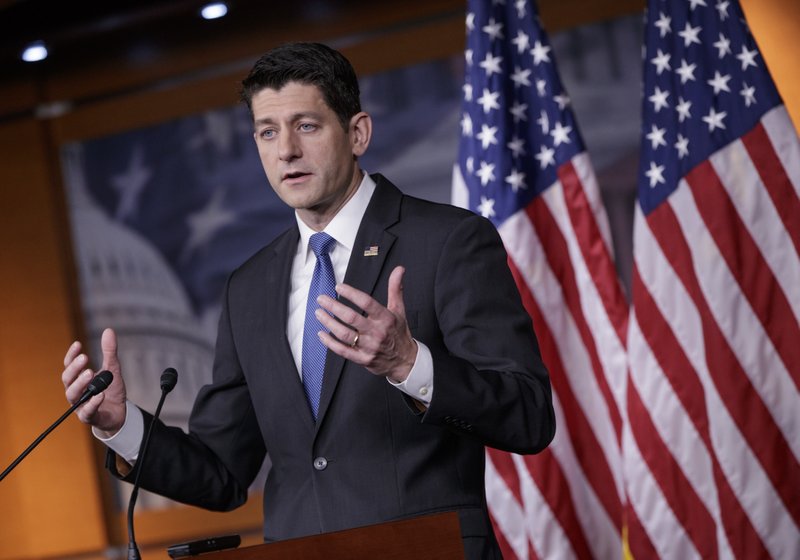
House Republicans are considering next steps on two immigration bills after GOP leaders persuaded moderate Republicans to drop their renegade effort to force votes on legislation that would have protected young “Dreamer” immigrants with a path to citizenship. Instead, leaders reached a deal with moderates and conservatives that will allow two votes on other bills, starting as soon as next week. Moderates were promised a vote on a compromise immigration plan, which remains a work in progress but will likely include a citizenship pathway for the young immigrants who have been living in the country illegally since they were children. Conservatives were guaranteed a vote on their favored approach, which provides a path to legal status but not citizenship. With a truce between the GOP’s factions, House Republicans were set to meet behind closed doors Wednesday to assess the process forward on an issue that has divided the party for years — and that leaders worried would damage the GOP ahead of the election season. A spokeswoman for Speaker Paul Ryan, R-Wis., AshLee Strong, announced the decision late Tuesday after a bargaining session with the lawmakers from the GOP’s conservative and moderate factions ended without agreement on a single package all sides could support. Moderates had been collecting signatures on a petition drive to would force a vote. Strong said the decision to consider two bills would avert the petition drive “and resolve the border security and immigration issues.” Leaders feared if the moderates had been able to collect the 218 votes needed, mostly from Democrats, it would embarrass Republicans by passing a bill that conservatives decried as amnesty for the young immigrants. Rep. Carlos Curbelo, R-Fla., a leader of the moderates’ petition drive, credited his group for forcing the issue to the fore. “Our goal has always been to force the House to debate and consider meaningful immigration reform, and today we’re one step closer,” Curbelo said. Conservatives were also pleased, certain that neither bill would necessarily win enough votes to pass, but confident the outcome would show the political strength of their preferred approach, a bill from Rep. Bob Goodlatte, R-Va. Rep. Mark Meadows, R-N.C., a leader of the conservative Freedom Caucus, said even if the bill fails, voting would show “we can just amend the Goodlatte bill” and try again. Strong said votes on the two bills would happen next week. But Meadows said a vote on the compromise plan may slip to the end of the month as talks continue crafting the legislation. For weeks, the party’s two wings have hunted for ways to provide a compromise that would provide the citizenship pathway and also bolster border security, but have failed to find middle ground. The House ended Tuesday’s session as moderates fell short of their stated goal of having 218 signatures — a majority of the chamber — on a petition that would force votes on other immigration bills that GOP leaders oppose. They had promised to do that by Tuesday in order to trigger those votes later this month. Instead, the centrists accumulated the names of all 193 Democrats but just 23 Republicans — two short of the number required. GOP leaders have strongly opposed the rarely used petition tactic, asserting those votes would probably produce a liberal-leaning bill backed by Democrats and just a smattering of Republicans. They’ve actively lobbied other moderates to not sign the petition, and in talks bargainers have sought legislation both sides could back or alternatively a way for each faction to get a vote on legislation they could support. The alternative measure is still under discussion. But a Republican familiar with the discussions said it would likely be based on a proposal by moderates that would grant the Dreamers a chance for citizenship but also provide the $25 billion President Donald Trump wants for his border wall with Mexico. It would also hew close Trump’s ideas for ending the diversity visa and impose curbs on legal immigration for some immigrant family members, changes that conservatives want. That Republican spoke on condition of anonymity to describe private talks. House Minority Leader Nancy Pelosi, D-Calif., criticized the GOP approach. “If Republicans plan to use Dreamers as a way to advance @realDonaldTrump’s xenophobic, anti-immigrant agenda, they will get a fight from House Democrats,” Pelosi said in a tweet. Any compromise bill would probably also include provisions changing how immigrant children are separated from their families at the border, aides said. Trump’s recent clampdown on people entering the U.S. illegally has resulted in hundreds of children being separated from their families and a public relations black eye for the administration. No law requires those children to be taken from their parents. A 2-decade-old court settlement requires those who are separated to be released quickly to relatives or qualified programs. But the White House has sought to change that and Republicans are seeking language to make it easier to keep the families together longer, said several Republicans. Advocates for immigrants have said the Goodlatte bill would allow minors to be detained longer than is now currently allowed. As talks between the House GOP’s factions continued, leaders worked to derail the moderates’ petition. As part of the effort, party leaders promised votes to later this year on a bill dealing with migrant agricultural workers and requirements that employers use a government online system to verify workers’ citizenship, according to three aides familiar with the negotiations. The Republicans spoke on condition of anonymity to describe private talks. Congress has been forced to deal with the immigration after Trump last year terminated the Deferred Action for Childhood Arrivals program, or DACA. Hundreds of thousands of young immigrants have benefited from DACA or could qualify for it, but risked of deportation as the program ended, though federal court orders have kept the program functioning for now. Senate efforts to pass immigration legislation failed earlier this year. Republished with permission from the Associated Press.
House Republicans in eleventh-hour attempt for immigration accord

Fractured House Republicans huddled privately Thursday as leaders tried pushing them toward consensus on immigration, racing the clock and trying to defuse a civil war within the party that threatens their effort to keep control of the chamber in November’s elections. But even as they gathered in a Capitol basement meeting room, there were no indications that a deal mending the party’s chasm over immigration was at hand and no definitive details of where middle ground might be. If leaders fail to find a solution, that would give momentum to moderates seeking to stage election-year votes in just three weeks on the issue, a showdown that leaders want to head off. Both conservative and moderate lawmakers, the two factions at odds over the issue, said they didn’t know what to expect as they entered the session. “I don’t know. That’s why I’m on time here, for once,” joked Rep. Leonard Lance, R-N.J., a moderate who’s joined the leadership-opposed rebellion aimed at forcing immigration votes. GOP lawmakers emerged from the office of Speaker Paul Ryan, R-Wis., on Wednesday saying he would present the rank and file with broad ideas for resolving a dispute that has split Republicans for years, damaging the party with Hispanic and moderate voters. “There’s some loose consensus right now,” said Rep. Carlos Curbelo, R-Fla., a leader of centrists threatening to force votes if they can’t strike a deal with conservatives. He said leaders would unveil “an outline of a potential bill,” while conservative leader Rep. Mark Meadows, R-N.C., said Ryan would present “concepts.” Curbelo, Rep. Jeff Denham, R-Calif., and other moderates need just two more GOP signatures on a petition to require immigration votes, assuming all Democrats sign on. If Thursday’s meeting doesn’t produce an accord, the moderates could reach that threshold quickly. The major hang-up in GOP talks has been how, as the moderates have demanded, to offer a chance for citizenship to young “Dreamer” immigrants brought to the U.S. illegally as children. Conservatives have opposed creating a special pathway for them to become citizens, calling it amnesty. “We’ve got the rule of law in this country, and nobody gets special consideration,” said Rep. Scott Perry, R-Pa., a member of the conservative House Freedom Caucus. Rep. Mark Walker, R-N.C., said a large group of conservatives he leads has discussed providing a pathway to citizenship to Dreamers in exchange for giving President Donald Trump nearly all the $25 billion he wants to build his proposed wall with Mexico. In addition, the conservatives want to end a lottery that grants visas to countries with few immigrants to the U.S. and curb the relatives who can be brought over by immigrants, Walker said. Democrats and at least some moderates would likely oppose such measures, giving it little chance of surviving in the more centrist Senate. Walker said the more Dreamers who’d be given an opportunity for citizenship, the tighter curbs on family-based migration would be. Roughly 700,000 people are protected under the Deferred Action for Childhood Arrivals program, or DACA, an Obama-era policy that Trump has halted. But by some estimates, 1 million or more other people qualify for that program but haven’t applied. The moderates’ petition would force House votes on four immigration bills, ranging from a liberal one helping Dreamers win citizenship to a conservative version curbing legal immigration. GOP leaders and conservatives say the votes the moderates would force would probably produce legislation that is too liberal, with all Democrats joining a handful of Republicans to push it through the House. Senate Republicans would block such a measure, and Trump would veto it if it went that far. But such an outcome could alienate conservative voters, damaging GOP chances for holding the House. Because of those divisions, averting the issue completely unless an agreement is reached has been the GOP leadership’s preference all year, until their hand was forced by moderates wielding the rarely used petition process. Republished with the permission of the Associated Press.
1st appeals court to weigh Donald Trump’s decision to end DACA
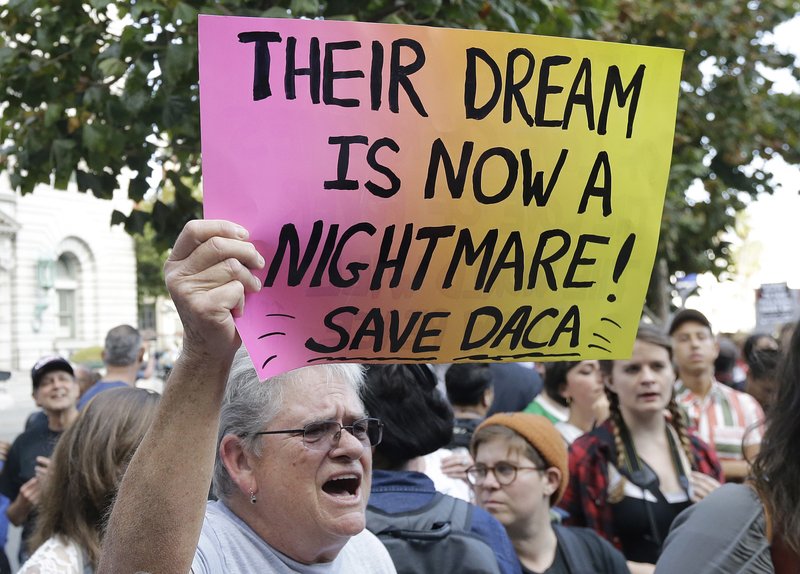
The Trump administration will try to convince a U.S. appeals court Tuesday that it was justified in ending an Obama-era immigration policy that shielded hundreds of thousands of young immigrants from deportation. The 9th U.S. Circuit Court of Appeals will be the first federal appeals court to hear arguments about President Donald Trump’s decision to phase out the Deferred Action for Childhood Arrivals program. DACA has protected some 700,000 people who were brought to the U.S. illegally as children or came with families that overstayed visas. A federal judge in San Francisco in January blocked the Trump administration’s decision to end DACA, reinstating the program in a decision that applied nationwide. U.S. District Judge William Alsup rejected the argument that President Barack Obama exceeded his power in implementing DACA and said the Trump administration failed to consider the disruption that ending the program would cause. “This has become an important program for DACA recipients and their families, the employers who hire them, for our tax treasuries, and for our economy,” the judge said. The Trump administration said it was forced to act because Texas and other states threatened to sue, raising the prospect of a chaotic end to the program. It wants the 9th Circuit to throw out Alsup’s ruling along with the five lawsuits he considered, including one by the state of California and another by the University of California’s governing body. “The rescission of DACA is based on what appears to be an argument that DACA was illegal when it was enacted, but that’s just wrong,” Jeff Davidson, an attorney representing UC regents, said on a recent conference call with reporters. Federal judges in New York and Washington, D.C., also have ruled against the Trump administration on DACA. The 2nd U.S. Circuit Court of Appeals is expected to hear arguments this summer on an appeal of the New York judge’s ruling. The DACA decision appears likely to end up before the U.S. Supreme Court eventually. The administration has been critical of the 9th Circuit and took the unusual step of trying to sidestep the appeals court and have the California DACA cases heard directly by the Supreme Court. The high court in February declined to do so. The 9th Circuit has ruled against Trump’s travel bans and is also considering the president’s executive order to cut off funding from so-called sanctuary cities that limit cooperation with federal immigration authorities. Trump has said he has considered breaking up the court, which is widely considered the most liberal of the U.S. appeals courts. Republished with permission from the Associated Press.
Texas suit could speed DACA’s path to Supreme Court
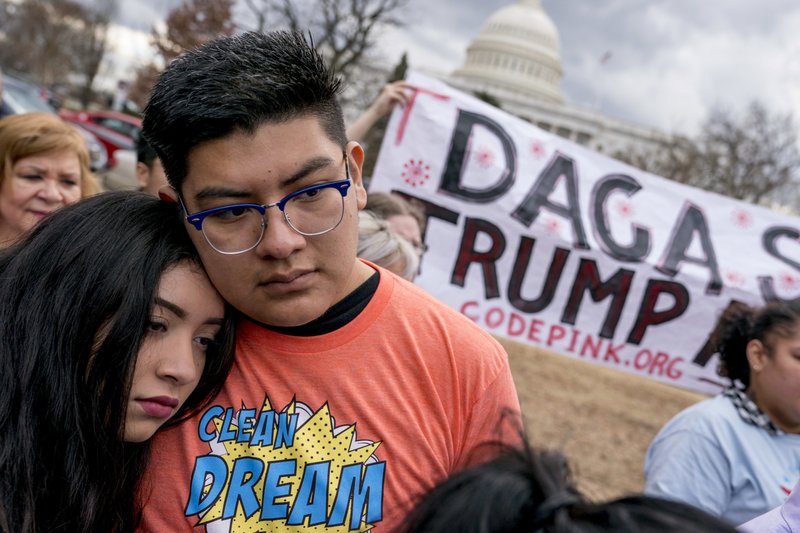
Three judges have ordered the Trump administration to continue a program that has shielded hundreds of thousands of young immigrants from deportation. Now, a lawsuit filed last week in Texas seeks to shut down the Deferred Action for Childhood Arrivals program and may create a legal clash that could speed the issue’s path to the Supreme Court. President Donald Trump’s decision in September to phase out the Obama-era program, called DACA, resulted in protests and a failed congressional effort to salvage it. Experts say it’s a matter of when, not if, the Supreme Court will rule on the program. It could be the second opportunity for the high court to weigh in on a high-profile decision of the president’s, with a ruling on Trump’s travel ban expected before the end of June. Josh Blackman, a professor at South Texas College of Law Houston, said the Texas lawsuit filed May 1 tees up “a fast pass to the Supreme Court.” If Texas and six other states persuade a judge to issue a nationwide order barring the government from continuing DACA, that decision could conflict with existing judges’ orders telling the government it must partially continue the program. That’s the kind of conflict the Supreme Court generally steps in to address. The high court has already finished hearing arguments ahead of its summer break at the end of June, and it’s rare for the court to hear arguments again before October. But if judges issue conflicting orders on what the government must do with DACA, the court might be asked to make an interim, procedural decision, said Stephen Yale-Loehr, who teaches immigration law at Cornell University’s law school. The Texas lawsuit “creates even more uncertainty in what is going to happen,” he said. DACA, created in 2012, has provided protection from deportation and work permits for about 800,000 young people who came to the U.S. as children and stayed illegally. A person enrolled in the program gets protection from deportation that lasts two years and can be renewed. Judges in California and New York have ruled that the Trump administration must allow current DACA participants to renew their enrollments, but the government doesn’t have to process new applications. A ruling by a judge in the District of Columbia would require the government to also process new applications, but it has been put on hold until late July. While these lawsuits challenged Trump’s decision to wind down DACA, the lawsuit filed by Texas, Alabama, Arkansas, Louisiana, Nebraska, South Carolina and West Virginia aims to end it. The states argue the creation of the program was unlawful, an overreach by President Barack Obama, a conclusion the Trump administration agrees with. And the states filed the case in a way to put it before a potentially sympathetic judge, U.S. District Judge Andrew Hanen in Brownsville, Texas. Hanen criticized the Obama administration for lax enforcement of immigration laws. And in 2015 he ruled against an expansion of DACA by Obama as well as a program that would have protected the parents of children who are in the country legally. His ruling blocking the programs was upheld by an appeals court. The Supreme Court, short a member after the death of Justice Antonin Scalia, was divided 4-4 on the case in 2016, leaving the lower court’s ruling in place. University of Texas law professor Stephen Vladeck said the Texas case “increases the likelihood of conflicting orders to the government and conflicting substantive conclusions about DACA’s legality.” If Hanen sides with the states, he could order the government to immediately stop processing new DACA applications or renewing old ones, which would contradict the existing orders. That would create a “pretty chaotic” situation that the Supreme Court would likely want to resolve, Vladeck said. Beyond what happens in Texas, two courts of appeal are readying to weigh in on DACA, too. Arguments before the San Francisco-based U.S. Court of Appeals for the 9th Circuit are scheduled for Tuesday. And arguments before the New York City-based U.S. Court of Appeals for the 2nd Circuit are expected this summer. There is also the possibility that the Trump administration could issue a new memo, replacing one from September, with a fuller explanation of why it chose to wind down DACA, a move that would lead to another flurry of legal filings. The fact the administration hasn’t yet done that, though, suggests it may be reluctant to do so. The Trump administration has seemed eager to get the issue to the Supreme Court quickly. Earlier this year it took the unusual step of asking the high court to hear the California case before a federal appeals court had ruled on it. The high court declined to do so in late February, but it may not be able to avoid the issue for long. “We’re moving toward the Supreme Court,” Vladeck said. “How quickly depends on what happens next.” Republished with permission from the Associated Press.
Alabama, 6 other states sue to end DACA
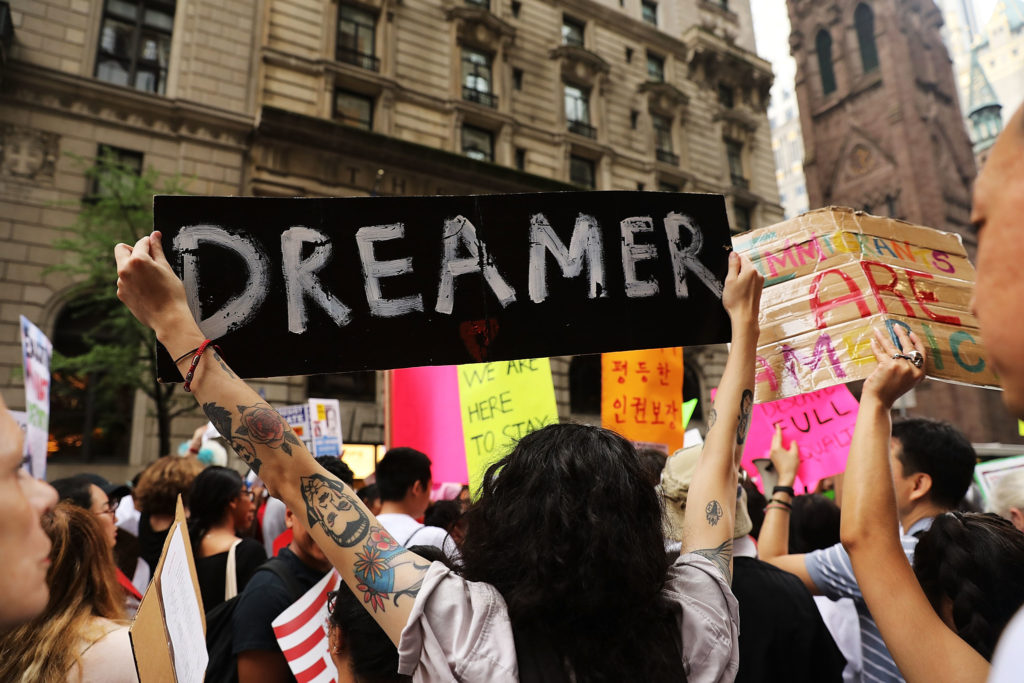
Alabama Attorney General Steve Marshall, along with AGs from six other states, filed a lawsuit Tuesday to end the Deferred Action for Childhood Arrivals (DACA) program, which was implemented by an Obama administration memo without the legal consent of Congress and protects hundreds of thousands of illegal immigrants nationwide from deportation. On Wednesday, Marshall joined the same multi-state coalition in filing a preliminary injunction against DACA. Since the Obama administration’s unilateral creation of the DACA program in 2012, nearly one million unlawful aliens have been given legal presence and work eligibility in the United States. “The U.S. Constitution is quite clear that Congress alone has the legal authority to write U.S. immigration law, not the President through an executive branch memo, said Marshall. “We are a nation of laws and when those laws are ignored by a branch of the federal government, as we have witnessed with the creation of DACA without Congressional approval, the proper response is to take legal action as our coalition of seven states has done. This purpose of this pursuit has never been to steer immigration policy, but to rightfully return policymaking to the legislative branch of government.” The suit follows a months old threat to sue the federal government to end the DACA program, which the Trump administration agreed to phase it out by March 2018. Since then, activist judges in at least three separate federal courts have issued rulings blocking the dismantling of DACA. The multi-state lawsuit asks a federal court to declare DACA unlawful and prevent the federal government from issuing or reviewing any additional DACA permits in the future. The suit however, does not call on the federal government to deport any unlawful aliens presently protected by DACA or rescind DACA permits already issued. Alabama is joined by Arkansas, Louisiana, Nebraska, South Carolina, Texas and West Virginia in filing the suit.
White House condemns ruling on Donald Trump’s ‘Dreamers’ program

The White House on Wednesday sharply criticized a federal judge’s ruling that the Trump administration must resume a program that has shielded hundreds of thousands of young immigrants from deportation. While the government has 90 days to restate its arguments before the order takes effect, presidential press secretary Sarah Huckabee characterized the ruling as “good news” for smuggling organizations and criminal networks and “horrible news for our national security.” If Tuesday’s ruling by U.S. District Judge John D. Bates in Washington survives the three-month reprieve, it would be a new setback for the Trump team because it would require the administration to accept requests from first-time applicants for the Obama-era program. Two nationwide injunctions earlier this year applied only to renewal requests for the Deferred Action for Childhood Arrivals program. DACA recipients are commonly referred to as “Dreamers,” based on never-passed proposals in Congress called the DREAM Act that would have provided similar protections for young immigrants. Siding with Princeton University and the NAACP, Bates said the administration’s decision in September to phase out the program over six months relied on “meager legal reasoning.” He invited the Department of Homeland Security to try again, “this time providing a fuller explanation for the determination that the program lacks statutory and constitutional authority.” The judge wrote that the administration’s explanation was “particularly egregious” because it didn’t mention that many of the hundreds of thousands covered by the program had obtained jobs and pursued education based on the assumption that they would be allowed to renew. DHS didn’t immediately respond to a request for comment. The administration contends the program started in 2012 is a misuse of executive power and that it had to act because Texas and other states threatened to sue. In January, U.S. District Judge William Alsup in San Francisco ruled that the administration failed to justify ending the program; his nationwide injunction forced the administration to resume accepting renewal requests within a week. A federal judge in New York issued a similar ruling in February; a judge in Maryland sided with the administration. The Supreme Court in February denied the administration’s unusual request to leapfrog appeals courts and take on Alsup’s injunction, ensuring that DACA would stay in effect for the time being. The 9th U.S. Circuit Court of Appeals put its review of Alsup’s decision on a fast track, but legal experts don’t expect a decision until June at the earliest. From there, it is expected to go to the Supreme Court, which may not rule until the spring of 2019. The administration could appeal immediately Bates’ ruling or try again with Bates in the 90-day window he gave. Consolidating the DACA challenges into a single case is a possibility, said Stephen Yale-Loehr, a professor of immigration law practice at Cornell University. “It’s complicated now because you have these different cases,” Yale-Loehr said. Nearly 690,000 people were enrolled when the Trump administration said it was ending the program, and 8 out of 10 were from Mexico. To qualify, they needed to have arrived before they turned 16, been younger than 31 in June 2012, completed high school or served in the military, and had clean criminal records. The two-year-permits are subject to renewal. Yale-Loehr estimates that tens of thousands of people who meet the criteria but never applied could benefit from Bates’ ruling. The NAACP, joined by two major labor unions, sued the administration in September. Princeton, joined by Microsoft Corp. and a student, followed in November. Bates, an appointee of President George W. Bush, combined the two cases. Princeton President Christopher L. Eisgruber said he was “delighted.” “While the decision does not fully resolve the uncertainty facing DACA beneficiaries, it unequivocally rejects the rationale the government has offered for ending the program and makes clear that the (Department of Homeland Security) acted arbitrarily and capriciously,” he said. Microsoft’s president, Brad Smith, said he hoped the ruling would motivate Congress to deliver a legislative fix. Bradford M. Berry, NAACP’s general counsel, called the ruling “a major win for advocates for justice and a compassionate democracy.” Republished with the permission of the Associated Press.
Donald Trump calls for border legislation using ‘nuclear option’

President Donald Trump demanded Monday that Congress pass new border legislation using the “Nuclear Option if necessary” to muscle it through the Senate — a drastic change in rules the Republican leader has previously dismissed. Trump tweeted that the U.S. must build a border wall, but argued that “Democrats want No Borders, hence drugs and crime!” He also said that a deal to help “Dreamer” immigrants is “dead because the Democrats didn’t care or act.” Trump has previously called for the “nuclear option” — changing Senate rules to end the filibuster. But Senate Majority Leader Mitch McConnell has dismissed that option in the past, saying Republicans will welcome the filibuster if they return to being the Senate minority. The White House did not immediately answer questions about Trump’s tweets. The $1.3 trillion funding package Congress passed last month included $1.6 billion in border wall spending. But much of that money can only be used to repair existing segments, not build new sections. Congress also put restrictions on the types of barriers that can be built. Trump began tweeting over the weekend on immigration from Florida, threatening to pull out of a free trade agreement with Mexico unless it does more to stop people from crossing into the U.S. The U.S., Canada and Mexico are participating in tense negotiations over the North American Free Trade Agreement at Trump’s insistence. He also claimed that people are flowing over the border “trying to take advantage of DACA. They want in on the act!” It was not immediately clear what Trump was referring to when he said people are coming to take advantage of the program Former President Barack Obama created the Deferred Action for Childhood Arrivals program to provide temporary protection and work permits to hundreds of thousands of immigrants who are living in the U.S. illegally after being brought here as children. The Obama administration allowed signups during a set period of time, and the program is closed to new entrants. Trump ended the program last year, but gave Congress six months to pass legislation enshrining it. A deal has so far proved elusive and Trump has blamed Democrats. The Department of Homeland Security is not issuing new permits, though existing ones can be renewed. Proposed DACA deals crafted by lawmakers and rejected by Trump also were not open to new participants. Trump did not explain what he meant when questioned by reporters as he entered the Church of Bethesda-by-the-Sea for an Easter Sunday service on Sunday, but again blamed Democrats for failing to protect the “Dreamers.” “The Democrats have really let them down,” he added during the annual White House Easter Egg Roll, adding: “It’s a shame.” Trump’s comments also ignore the fact that the DACA solution he proposed mustered only 39 votes in the Senate, not enough to pass even if the Senate did approve the nuclear option. Meanwhile, the bipartisan option the White House vigorously lobbied against did gain a majority of votes, but fell six votes shy of the 60 needed to advance under Senate rules. Trump promised during the 2016 presidential campaign to build a Southern border wall to stop illegal immigration and drugs from Mexico, but Congress has frustrated him by not moving as quickly as he wants to provide money for construction. The president also complained on Twitter that border patrol agents can’t do their jobs properly because of “ridiculous liberal (Democrat) laws” that allow people caught for being in the country illegally to be released while they await a hearing before a federal immigration judge. Trump tweeted that the situation is “Getting more dangerous” and “Caravans” are coming. The president’s tweets came after Fox News’ “Fox & Friends” reported early Sunday on what it said is a group of 1,200 immigrants, mostly from Honduras, headed to the U.S. About 1,100 migrants, many from Honduras, have been marching in a caravan along roadsides and train tracks in the southern Mexico state of Oaxaca. These “Stations of the Cross” migrant caravans have been held in southern Mexico for at least the last five years. They began as short processions of migrants, some dressed in biblical garb and carrying crosses, as an Easter-season protest against the kidnappings, extortion, beatings and killings suffered by many Central American migrants as they cross Mexico. Individuals in the caravans often try to reach the U.S. border, but usually not as part of the caravan. The caravans usually don’t proceed much farther north than the Gulf coast state of Veracruz. The current march is scheduled to end this month with a conference on migration issues in the central Mexican state of Puebla, east of Mexico City. The Fox headline was “Caravan of illegal immigrants headed to U.S.” The president is known to watch the cable TV program in the morning. Brandon Judd, leader of the union representing border patrol agents, predicted on “Fox & Friends” that those in the caravan would create havoc and chaos in the U.S. as they wait for what he described as immigration reform. Judd also said Congress needs to pass tougher laws, an idea Trump appeared to echo, and create more bed space for immigration authorities to house people. Mexico routinely stops and deports undocumented Central Americans, sometimes in numbers that rival those of the United States. Deportations of foreigners dropped from 176,726 in 2015 to 76,433 in 2017, in part because fewer were believed to have come to Mexico, and more were requesting asylum in Mexico. Republished with the permission of the Associated Press.
Leaders finalize U.S. budget bill voting could begin Thursday
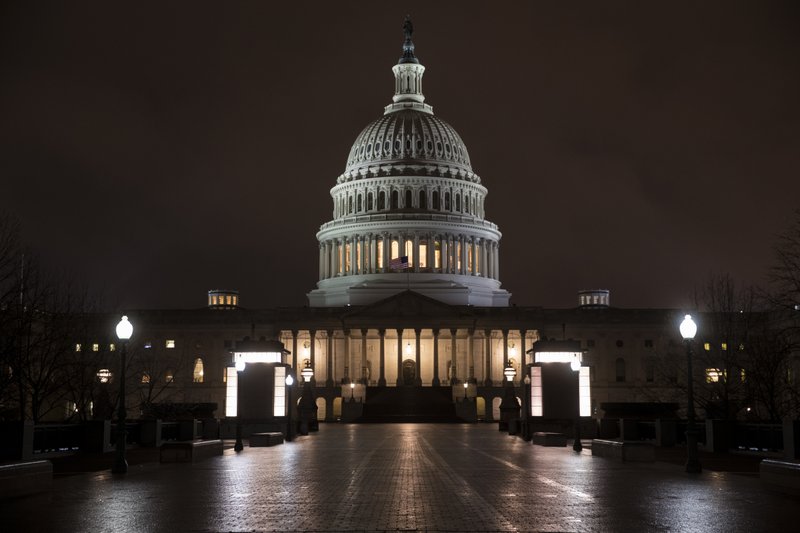
Congressional leaders have finalized a sweeping $1.3 trillion budget bill that substantially boosts military and domestic spending but leaves behind young immigrant “Dreamers,” deprives President Donald Trump some of his border wall money and takes only incremental steps to address gun violence. As negotiators stumbled toward an end-of-the-week deadline to fund the government or face a federal shutdown, House Speaker Paul Ryan dashed to the White House amid concerns Trump’s support was wavering. Although some conservative Republicans balked at the size of the spending increases and the rush to pass the bill, the White House said the president backed the legislation. Trump himself sounded less than enthused, tweeting late Wednesday: “Had to waste money on Dem giveaways in order to take care of military pay increase and new equipment.” Talks had stretched into Wednesday evening before the 2,232-page text was finally released. “No bill of this size is perfect,” Ryan said. “But this legislation addresses important priorities and makes us stronger at home and abroad.” Leaders hoped to start voting as soon as Thursday. A stopgap measure may be needed to ensure federal offices aren’t hit with a partial shutdown at midnight Friday when funding for the government expires. Negotiators have been working for days — and nights — on details of the bill, which is widely viewed as the last major piece of legislation likely to move through Congress in this election year. Lawmakers in both parties sought to attach their top priorities. Two of the biggest remaining issues had been border wall funds and a legislative response to gun violence after the clamor for action following recent school shootings, including the one in Parkland, Florida. On guns, leaders agreed to tuck in bipartisan provisions to bolster school safety funds and improve compliance with the criminal background check system for firearm purchases. The bill states that the U.S. Centers for Disease Control and Prevention can do research on gun violence, though not advocacy, an idea Democrats pushed. But there was no resolution for Dreamers, the young immigrants who have been living in the United States illegally since childhood but whose deportation protections are being challenged in court after Trump tried to end the Deferred Action for Childhood Arrivals program, or DACA. Democrats temporarily shut down the government earlier this year as they fought for that protection. But the issue only rose to a discussion item when Trump made a late-hour push for a deal in exchange for $25 billion in border wall funds. Instead, Trump is now poised to win $1.6 billion for barriers along the border, but none of it for the new prototypes he recently visited in California. Less than half the nearly 95 miles of border construction, including levees along the Rio Grande in Texas, would be for new barriers, with the rest for repair of existing segments. In one win for immigrant advocates, negotiators rejected Trump’s plans to hire hundreds of new Border Patrol and immigration enforcement agents. “We are disappointed that we did not reach agreement on Dreamer protections that were worthy of these patriotic young people,” said House Minority Leader Nancy Pelosi. The emerging plan removes a much-debated earmark protecting money for a rail tunnel under the Hudson River. The item was a top priority of Trump’s most powerful Democratic rival, Senate Minority Leader Chuck Schumer of New York, but Trump vowed to veto the bill over the earmark. Under the legislation, the project would remain eligible for funding, however, and a Schumer aide said it was likely to win well more than half of the $900 million sought for the project this year. The core purpose of the bill is to increase spending for military and domestic programs that have been sharply squeezed under a 2011 agreement that was supposed to cap spending. It gives Trump a huge budget increase for the military, while Democrats scored wins on infrastructure and other domestic programs that they failed to get under President Barack Obama. That largesse has drawn opposition from some fiscal conservatives and could make passage a potentially tricky process. Last month, Kentucky Sen. Rand Paul triggered a brief government shutdown over his objections to the deficit spending. On Wednesday, he tweeted his opposition to the emerging legislation, known as an “omnibus.” “It’s a good thing we have Republican control of Congress or the Democrats might bust the budget caps, fund planned parenthood and Obamacare, and sneak gun control without due process into an Omni … wait, what?” Paul tweeted. Most essential was support from Trump, who has been known to threaten to veto legislation even when his team is involved in the negotiations. Word of Trump’s discontent sent Ryan to the White House, where he was invited to a face-to-face with the president, with Senate Majority Leader Mitch McConnell on the phone. White House aides said the president’s support was never in doubt, but one senior White House official said the president was concerned that details of the package weren’t being presented as well as they could be, both to members of Congress and the public. The group discussed how they could better sell the package, said the official, who was granted anonymity to discuss the private conversation. “The president and the leaders discussed their support for the bill,” said White House press secretary Sarah Huckabee Sanders, adding that it would fund Trump priorities such as wall construction, add money to combat the opioid crisis and provide new infrastructure spending. Both parties touted $4.6 billion in total funding to fight the nation’s opioid addiction epidemic, a $3 billion increase. More than $2 billion would go to strengthen school safety through grants for training, security measures and treatment for the mentally ill. Medical research at the National Institutes of Health, a longstanding bipartisan priority, would receive a record $3 billion increase to $37 billion. Funding was also included for election security ahead of the 2018 midterms. Child care and development block grants would receive a huge $2.4 billion increase to $5.2 billion.


